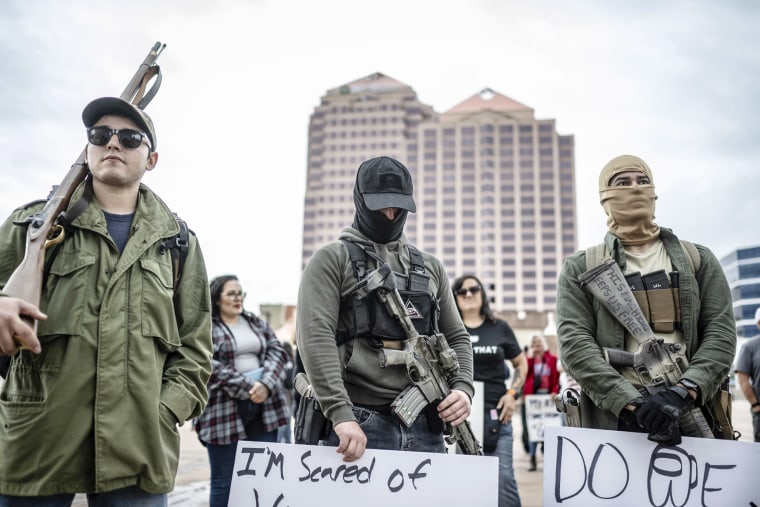Last week, Michelle Lujan Grisham, New Mexico’s Democratic governor, issued an emergency order that purports to suspend for 30 days people’s right to carry firearms in Albuquerque. The order came in the wake of a shooting Thursday that killed an 11-year-old boy outside a baseball game.
Anyone who values public safety can appreciate her desire to protect people from gun violence. Public order and safety are, after all, primary purposes of the law.
But in issuing the order, Lujan Grisham may have tripped over the rule of law herself. One cannot stand up for the legal order while at risk of violating its first principle. An executive official who uses a laudable end to justify means of questionable constitutionality sets a precedent that could easily come back to haunt us all.
We’re not talking abstractions here. We’ve come close to experiencing the danger from a suspension of rights by an elected leader on the basis of perceived “higher principles.”
One cannot stand up for the legal order while at risk of violating its first principle.
On Jan. 6, 2021, for example, it was rumored that President Donald Trump might declare an emergency and invoke the Insurrection Act. It provides presidents with the authority “to use the militia or the armed forces” to suppress rebellions. As such, it overrides the statutory right of citizens to be free of domestic military intervention.
At the time, the Proud Boys, fancying themselves a state militia, had stored an arsenal of weapons in Virginia to take into Washington in the event that Trump invoked the Insurrection Act. We don’t know what communications they had with the White House or how close we came to a far more heavily armed insurrection.
The point is this: Once we start defending an official’s declaration of an emergency that suspends rights based on his or her values, the slope is slippery and treacherous.
Looking ahead, how much easier would it be for Trump — should he be re-elected in 2024 — to declare a future emergency to justify freezing freedom of the press or free speech rights if he can point to a Democratic governor’s having set the precedent in 2023?
In issuing her emergency order, Lujan Grisham has suspended rights the Supreme Court has declared protected by the Second Amendment.
Of course, it’s a huge stretch of the Second Amendment’s text to conclude that the framers imagined they were giving ordinary citizens an unrestricted right to carry concealed firearms in the streets. The amendment opens with words that announce its subject: “A well-regulated Militia.”
But in June 2022, the court ruled that people’s unregulated right to carry hidden sidearms is constitutional. The court overturned a century-old New York statute that required a person to show a “special need” — such as that of an off-duty police officer — to obtain a license to pack a concealed gun.
Many who follow the court severely criticized the ruling. I wrote at the time: “Overturning [the 1905 New York statute] seems less an act of fidelity to the original meaning of the Constitution and Bill of Rights than bending Second Amendment jurisprudence to fit right-wing ideology.”
Such a view, however, even if it is shared by Gov. Lujan Grisham, shouldn’t justify her emergency suspension of that right unless and until the court decides differently.
This isn’t a case of civil disobedience in which private citizens accept the consequences of going to jail (as Martin Luther King Jr. did in 1963) for breaking a law with which they morally disagree. This is an elected official making state policy.
The Democratic governor reportedly said she expects legal challenges but was compelled to act because of recent shootings. She would most likely argue that a state’s police power enables it to declare health emergencies that override constitutional rights.
But there is a better way to resolve legal uncertainty that doesn’t involve an executive’s declaring a suspension of rights: Go to court and seek an emergency judicial declaration that the exigent public need justifies it.
Instead, Lujan Grisham simply aimed and fired.
Again, the risks of undermining trust in the law aren’t hypothetical. Many criticized Trump for issuing — without prior court approval — multiple unlawful executive orders banning entry into the U.S. by people from Muslim nations.
The same was true in March 2018, when his administration unilaterally revoked DACA, withdrawing protection from deportation for nearly 700,000 immigrant children known as “dreamers.” Courts had to step in to protect their rights.
The risks of undermining trust in the law aren’t hypothetical.
There are many more examples. Perhaps the worst was Trump’s ignoring the constitutional role of federal courts after the 2020 election.
Indeed, Trump now stands accused in an indictment of violating civil rights by seeking to overturn the election when more than 60 courts rejected his spurious claims that the election was stolen because of ballot fraud.
The danger posed by unlawful extrajudicial action is little different when the shoe is on the other political foot. It can be a hard fall when elected officials undermine the rule of law for any reason.
Moreover, it’s unlikely that Lujan Grisham’s order will save any lives. Albuquerque Police Chief Harold Medina has vowed not to enforce it. Consequently, many gun owners won’t obey it. That is how respect for the law gets diluted.
We all make mistakes. While the governor’s motivation was understandable, her misstep was a serious one.
